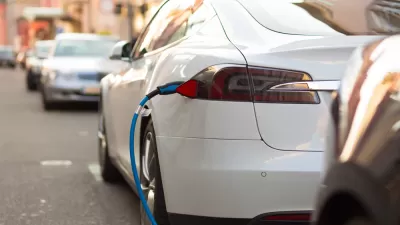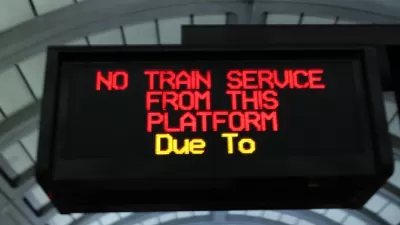TransitCenter's Steven Higashide argues that despite all the hype around self-driving vehicles, traditional high-capacity transit still has some distinct advantages. As long, that is, as transit agencies are willing to recognize them.

In a post adapted from remarks made by Steven Higashide, its director of research, TransitCenter outlines several things transit agencies should keep in mind as self-driving vehicles loom large in the public mind. "The threat that automated vehicles pose to public transit," he argues, "is a political threat."
Higashide's points include the following:
- High-capacity transit makes more efficient use of urban space than smaller vehicles, even when they're automated and/or shared.
- It'll be a while until automated vehicles can safely navigate busy urban cores and residential neighborhoods, even if they can be made functional on highways.
- Despite the high-tech veneer of public partnerships with transportation startups, "testing new technology for global motor vehicle markets for its own sake is a job for universities, research agencies, and private R&D."
- Transit systems need to become more competitive for current riders, and not simply hold out for potential tech-enabled solutions down the line.
FULL STORY: 4 Things For Transit Agencies to Remember in a World of Driverless Car Hype

Alabama: Trump Terminates Settlements for Black Communities Harmed By Raw Sewage
Trump deemed the landmark civil rights agreement “illegal DEI and environmental justice policy.”

Study: Maui’s Plan to Convert Vacation Rentals to Long-Term Housing Could Cause Nearly $1 Billion Economic Loss
The plan would reduce visitor accommodation by 25% resulting in 1,900 jobs lost.

Planetizen Federal Action Tracker
A weekly monitor of how Trump’s orders and actions are impacting planners and planning in America.

Waymo Gets Permission to Map SF’s Market Street
If allowed to operate on the traffic-restricted street, Waymo’s autonomous taxis would have a leg up over ride-hailing competitors — and counter the city’s efforts to grow bike and pedestrian on the thoroughfare.

Parklet Symposium Highlights the Success of Shared Spaces
Parklets got a boost during the Covid-19 pandemic, when the concept was translated to outdoor dining programs that offered restaurants a lifeline during the shutdown.

Federal Homelessness Agency Places Entire Staff on Leave
The U.S. Interagency Council on Homelessness is the only federal agency dedicated to preventing and ending homelessness.
Urban Design for Planners 1: Software Tools
This six-course series explores essential urban design concepts using open source software and equips planners with the tools they need to participate fully in the urban design process.
Planning for Universal Design
Learn the tools for implementing Universal Design in planning regulations.
Caltrans
Smith Gee Studio
Institute for Housing and Urban Development Studies (IHS)
City of Grandview
Harvard GSD Executive Education
Toledo-Lucas County Plan Commissions
Salt Lake City
NYU Wagner Graduate School of Public Service





























